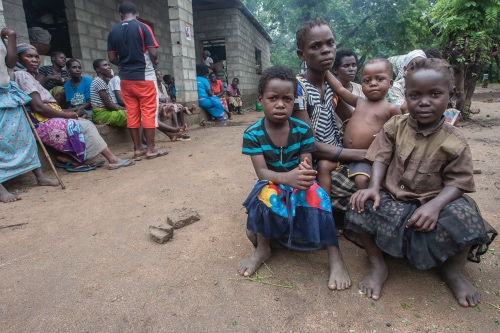The death toll from Cyclone Idai in the southern African nations of Mozambique, Zimbabwe and Malawi has now passed at least 600 with thousands of people still in need of immediate help.
The cyclone striuck Mozambique earlier this month centred on the port city of Beira before moving over land to Zimbabwe and Malawi.

On 18th March in Malawi, Mary Staford and her daughters, Milika Staford, two, sit with Eva Staford (right), five, and Maru Staford (left), six, and other people displaced by floods at Nyachilenda School camp in the area of Traditional Authority Ndamera in Nsanje District in Southern Malawi. PICTURE: © UNICEF/UN0291141/Gumulira
Officials in Mozambique have now put the death toll there at 446 while in Zimbabwe different figures of 259 and 154 are being cited. In Malawi there were 56 deaths after heavy rain caused flash flooding ahead of the cyclone’s arrival.
About 1.7 million people have been affected by the cyclone, half of these are estimated to be children.
On Friday, Henrietta Fore, UNICEF‘s executive director, described the situation as “critical”.
“There is no electricity or running water,” said Fore, who arrived in the Mozambique city of Maputo Thursday night. “Hundreds of thousands of children need immediate help. The priority right now is to give them shelter, food, water, education and protection.”
Thousands of affected people in Mozambique were reportedly congregating in informal, improvised camps.
Meanwhile in Malawi, UNICEF reports that thousands of families have been made homeless and are now lacking basic supplies including food, water and sanitation facilities while buildings like schools, churches and other public buildings are being used for shelter.
In Zimbabwe, an estimated 250,000 people were reportedly in need of humanitarian assistance with the number likely to increase as unreached areas are accessed.
Following a visit to Beira and a flight over surrounding areas, Elhadj As Sy, the secretary-general of the International Federation of Red Cross and Red Crescent Societies, described the scope and scale of the suffering and damage as “breath-taking”.
But he said on Friday that it can’t be forgotten that despite its “staggering” scale, “it is an intimate and human crisis”.
“Tens of thousands of families have lost everything. Children have lost parents. Communities have lost schools and clinics.”
“Tragically, we know that the full picture of this disaster is probably even worse than it seems now. The death toll will probably rise further as more and more areas are reached and as more and more bodies are recovered.”
There is growing concern over potential disease outbreaks with some cholera cases already reported in Beira and an increase in malaria infections.





